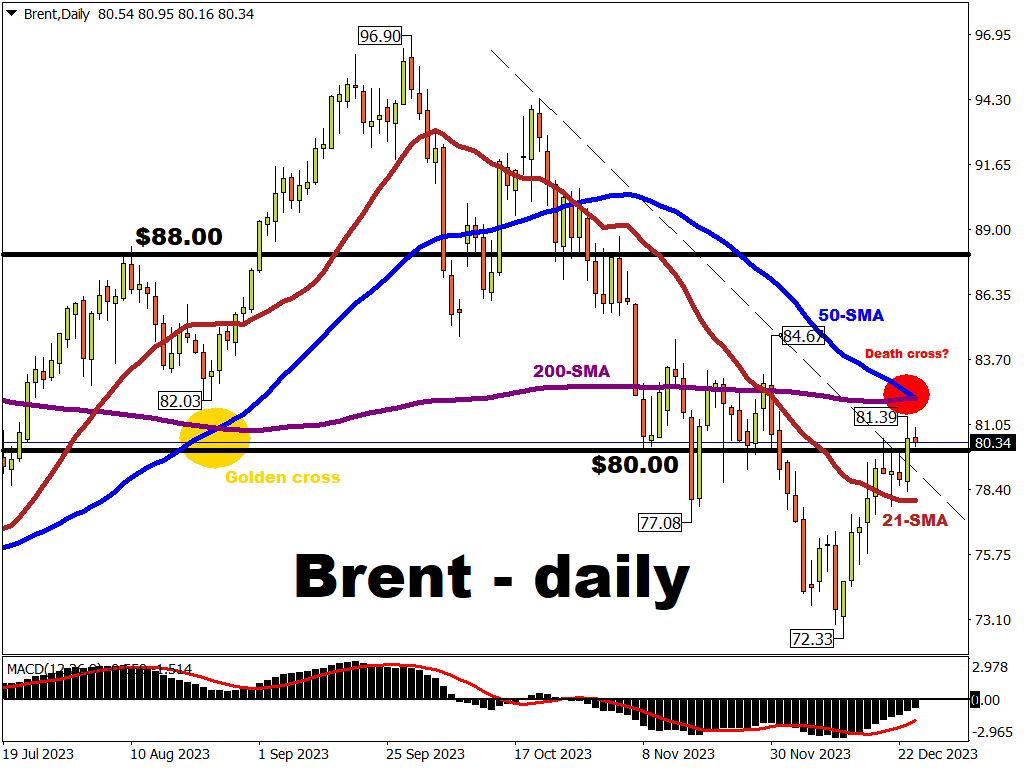- Fed pivot, geopolitical fears have fuelled oil's recent rebound
- Brent's 50-day SMA now crossing below 200-day counterpart
- Such a "death cross" could signals declines ahead for oil prices
- After the last "death cross" in Sept 2022, Brent fell by a further 21% through March 2023
- Still, fundamental forces may offset potentially bearish technical signal
In recent weeks, Brent oil has enjoyed a rare bounce after making multi-month lows in mid-December.
Recall on December 13th, the global benchmark for oil prices touched $72.33, a price last seen in July.
Since then, Brent has rebounded strongly and is now trading back above $80.

The rebound over the past couple of weeks appear to have been sparked by the Fed's policy pivot.
With policymakers at the US central bank now forecasting several rate cuts in 2024, oil bulls are drawing comfort from the idea that those demand-destroying rate hikes triggered since March 2022 are now relegated to the past.
Middle East conflict further fuelling oil's rebound
More recently, geopolitical tensions in the Middle East have picked up once more as Yemen-based Houthi attacks on ships in the Red Sea disrupted global trade.
A multinational maritime task force, including the US, has been set up to protect commercial ships in the region.
On the back of this, Denmark’s Maersk said on Sunday it was preparing to resume operations on the Red Sea and the Gulf of Aden.
But US military strikes on an insurgent group in Iraq ratcheted up escalation concerns that could spark flashpoints in the region.
Warnings from Israel that the Gaza war could go on for many months also stoked fears.
The uncertainty of the general conflict and Iran’s possible responses mean markets may keep some sort of risk premium in crude prices.
Demand side bolsters outlook
Brent made gains of over 3% last week though trading volumes are thin amid ongoing holidays in some markets.
Further signs of easing US inflation in data released just before the holiday period reinforced expectations that the Fed will begin cutting interest rates early next year.
Policy easing by the Fed could potentially support global growth and the energy demand outlook.
A weaker dollar would also provide possible tailwinds to the commodity complex.
Technical Analysis: "Death cross" in play
The December dip in Brent crude didn’t quite reach major support from earlier in the year around $72.
Since then, prices have moved up around 10% in total and are approaching the 50-day and 200-day simple moving averages (SMA).
In fact, those two widely watched technical indicators are now crossing over with the 50-day moving below the 200-day simple average.
That means a "death cross" is forming and indicates a potential resumption of the multi-month downward trend.
The last time that Brent formed a "death cross" on the daily timeframe was back in September 2022.
After that last "death cross", Brent went on to drop by over 20% when it reached an intraday low of $70.07 in March 2023.
To be clear, the dreaded gauge does not always predict lower markets, even if it is a red flag and caution prevails.
On the flip side, some market watchers believe a death cross can signal a bearish market has run its course and it could be a good time to buy.
"Bearish" technical signals may be offset by fundamental factors
Beyond the potential cues from a looming "death cross", oil prices may continue finding more near-term support from the supply-demand dynamics in global oil markets.
Over the short-term, Brent prices could be prevented from falling too far below $80/bbl by:
- a still-moderating US dollar on hopes for Fed rate cuts in 2024
- persistent fears of supply disruptions out of the Middle East conflict.